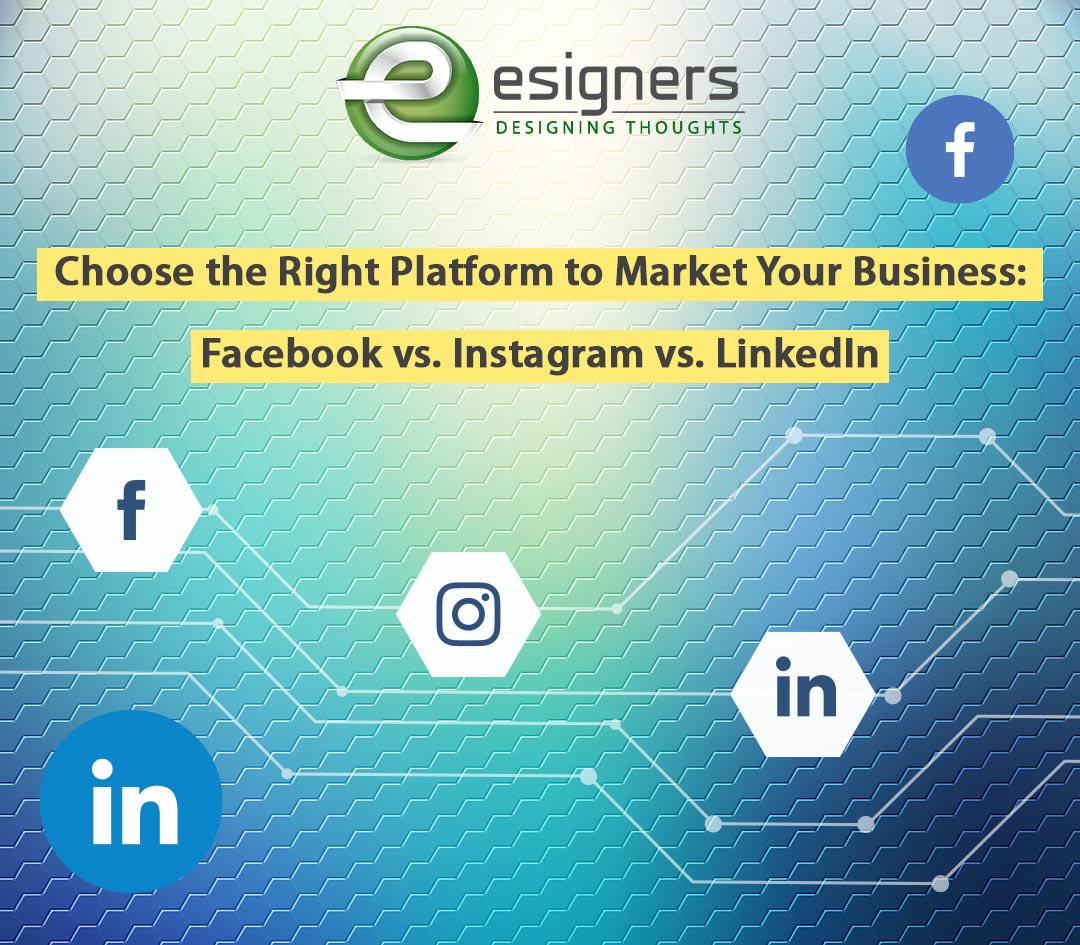Blog
Choose the Right Platform to Market Your Business: Facebook vs. Instagram vs. LinkedIn

March 11th, 2024 by esigners
In today’s digital age, social media platforms have become indispensable tools for businesses to market their products and services effectively. With millions of users worldwide, platforms like Facebook, Instagram, and LinkedIn offer unique opportunities to reach target audiences and engage with potential customers. However, each platform has its own strengths and limitations, making it essential for businesses to understand which one aligns best with their marketing objectives. In this article, we’ll explore the key differences between Facebook, Instagram, and LinkedIn to help you determine the right platform to market your business.
Facebook: The All-Purpose Platform
Facebook remains one of the most popular social media platforms globally, boasting over 2.8 billion monthly active users. Its diverse user base spans across different age groups, making it suitable for businesses targeting a wide range of demographics. Facebook offers various marketing tools, including Pages, Groups, and Ads, allowing businesses to create a strong online presence and engage with their audience effectively.
Advantages:
- Wide Reach: With billions of users, Facebook provides extensive reach, enabling businesses to connect with potential customers worldwide.
- Targeted Advertising: Facebook’s robust advertising platform allows businesses to target specific demographics, interests, and behaviors, ensuring that their ads reach the most relevant audience.
- Engagement Features: Features like comments, likes, and shares facilitate interaction with customers, helping businesses build relationships and loyalty.
Limitations:
- Declining Organic Reach: Over the years, Facebook’s algorithm changes have resulted in decreased organic reach for business Pages, necessitating investment in paid advertising to achieve significant visibility.
- Saturation: With numerous businesses vying for users’ attention, standing out on Facebook requires strategic content and advertising efforts.
- Demographic Shifts: While Facebook still appeals to a broad demographic, younger audiences are increasingly gravitating towards other platforms like Instagram and TikTok.
Instagram: Visual Storytelling for Brands
Instagram, owned by Facebook, has rapidly grown into one of the most influential social media platforms, particularly among younger demographics. Focused on visual content, Instagram allows businesses to showcase their products or services through photos and videos, making it ideal for brands with visually appealing offerings.
Advantages:
- Visual Appeal: Instagram’s emphasis on high-quality visual content enables businesses to create compelling narratives and showcase their brand identity effectively.
- Engagement: The platform’s highly engaged user base actively interacts with content through likes, comments, and shares, fostering community engagement and brand loyalty.
- Influencer Marketing: Instagram’s influencer ecosystem provides opportunities for businesses to collaborate with influencers and reach niche audiences authentically.
Limitations:
- Limited Linking Options: Unlike Facebook, Instagram has limited options for including clickable links in posts, making it challenging to drive traffic directly to external websites.
- Algorithm Changes: Similar to Facebook, Instagram’s algorithm changes can impact organic reach, necessitating a balance between organic content and paid advertising.
- Content Saturation: As with any popular platform, competition for visibility is high, requiring businesses to consistently deliver high-quality content to stand out.
LinkedIn: Professional Networking and B2B Marketing
LinkedIn stands out as the premier platform for professional networking, making it an excellent choice for businesses targeting B2B audiences or seeking to establish thought leadership within their industry. With over 700 million users, LinkedIn offers a platform for sharing industry insights, connecting with decision-makers, and generating leads.
Advantages:
- Professional Audience: LinkedIn’s user base consists primarily of professionals and businesses, making it an ideal platform for B2B marketing and networking.
- Thought Leadership: Publishing long-form content, participating in industry discussions, and sharing insights can help businesses establish themselves as thought leaders in their respective fields.
- Lead Generation: LinkedIn’s advanced targeting options enable businesses to reach decision-makers and influencers directly, facilitating lead generation and business development efforts.
Limitations:
- Niche Audience: While LinkedIn’s professional focus is advantageous for B2B marketing, businesses targeting consumer audiences may find the platform less effective.
- Content Tone: Content on LinkedIn tends to be more formal and professional, requiring businesses to adapt their messaging and tone accordingly.
- Limited Organic Reach: Similar to other platforms, organic reach on LinkedIn can be limited, necessitating a combination of organic content and paid advertising to maximize visibility.
Choosing the right social media platform to market your business depends on various factors, including your target audience, marketing objectives, and content strategy. While Facebook, Instagram, and LinkedIn offer unique opportunities for businesses to connect with their audience and promote their brand, it’s essential to evaluate each platform’s strengths and limitations in the context of your specific business goals. By understanding the distinct advantages and challenges of each platform, you can develop a comprehensive social media marketing strategy that effectively engages your target audience and drives business growth.
